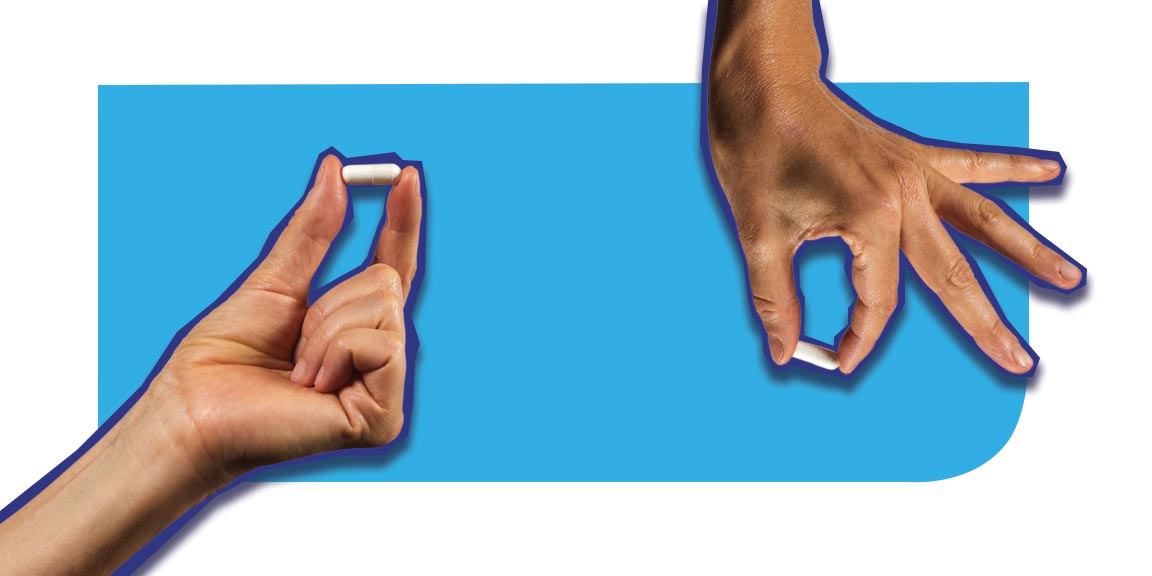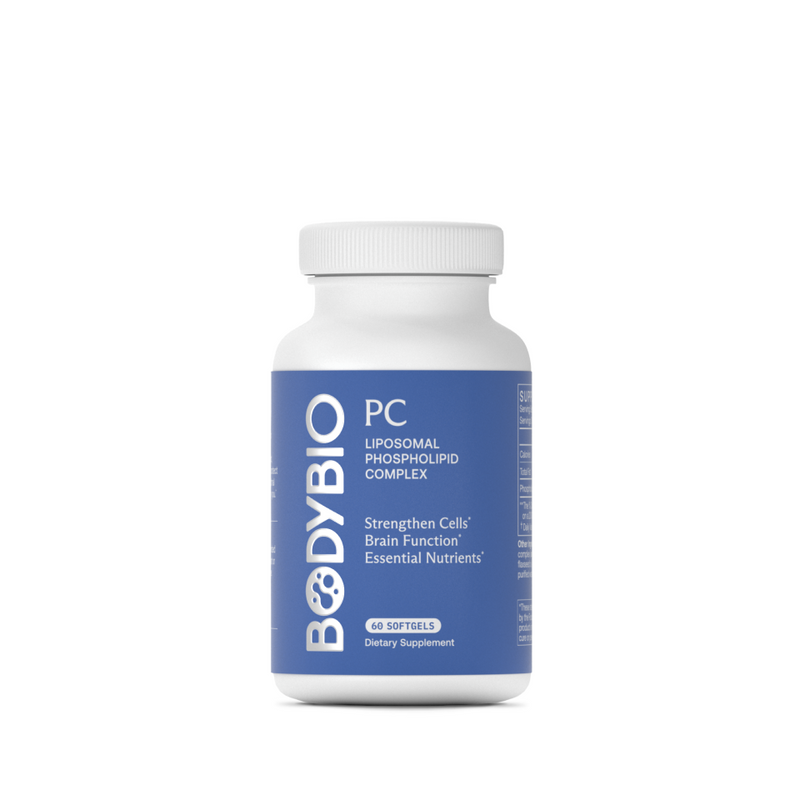NAD+: New Findings in Cellular Health, Longevity, & Anti-Aging
Authors:

Dr. Thomas Wnorowski
PhD, CNCC Research Director, BodyBio & Biomedical NutritionistKey Takeaways:
Key Takeaways:
- NAD+ is essential to life and may play a key role in increasing longevity.
- PC has been shown to support a healthy cell membrane, and in turn better brain functioning as we age.*
- PC and NAD+ together may create a winning combo of anti-aging.
Even with all the technology currently at our fingertips, we have yet to create a modern Neverland, the mythical place where Peter Pan embarked on the original “anti-aging lifestyle.” While magic may have helped our friend Peter stay a young boy forever, science may be closer than ever to slowing the aging process at the cellular level, via two powerful chemicals. NAD+ and Phosphatidylcholine (PC) work together to heal and nourish cells to keep us healthier and sharper longer.
There’s been a lot of buzz on NAD in recent years (and even more in recent months), mostly thanks to some successful studies in mice treated with NAD+ and a boom in popularity. These studies have explored the connection between an increase in NAD+ levels and whether or not that boost results in an increase in health and longevity. While more human studies need to be completed, researchers believe that by boosting our NAD levels we’re more resilient to molecular stressors — like sun damage — that affect our cells and put our bodies under attack, leading to disease and health problems.
What is NAD+?
NAD+ is a molecule found in all living cells and is critical for regulating cellular aging and maintaining proper function of every cell. In other words, we couldn’t live without it. Levels of NAD+ in people and animals diminish significantly over time, and researchers have found that re-upping NAD+ in older mice causes them to look and act younger, and live longer than expected.
Does NAD+ Have Anti-Aging Powers?
NAD+ is nicotinamide adenine dinucleotide, the oxidized form of (reduced) NADH. With its water-soluble vitamin B backbone, NAD+ is critical for the maintenance of normal energy balance and circadian rhythm. When NAD+ gains a charged hydrogen and a pair of electrons, it becomes NADH. The combination of negatively-charged electrons and the positively-charged NAD+ cancel each other out in this activity.
Levels of NAD+ fall as we age, affecting proteins called sirtuins. These are supporters of metabolism and energy manufacture, and regulators of oxidative stress, DNA damage, aging, and maybe even the controllers of some diseases, such as cancer and insulin resistance.
In the matter of age-related metabolic issues, strengthening sirtuin activity via NAD+ or NADH intake ups the ante on longevity and well-being. Not surprisingly then, NAD+ is essential for life and while more research is certainly needed, current data from animal studies is showing the potential to make your body and mind sharper via supplemental NAD+.
How Does Phosphatidylcholine Support NAD+ in Cellular Health?
Phosphatidylcholine is the structural material from which the cell membrane is made, and concurrently is the functional entity that serves several metabolic processes essential for memory, mitochondrial function, and brain health. Since approximately 60% of the brain is fat, having low levels of PC in the body highly impacts the brain, affecting memory, mental alertness, behavior, and focus.
There is one important side note here — not all PC is created equal. When extracted correctly (as we do with BodyBio PC), PC is liposomal, sending phospholipids through the digestive wall, throughout body and into the brain, rebuilding whichever cells need repair.
PC and NAD+ work together to support the total health of cells and to keep all the processes of your body working together seamlessly.
NAD+ PC: An Anti-Aging, Brain Sharpening Super Duo?
Now that we’ve uncovered the importance of both PC and NAD+ to the health of the body, let’s explore how they work together to support anti-aging. PC restores the architectural curvature to each of our 60 trillion+ cells, optimizing the processes of each part of the cell. Similarly, supplemental NAD is key to restoring cellular health overall, you can think of NAD+ as a recharging system for the cell.
In other words, combining this dream team of nutraceuticals nourishes and re-builds cells and may even turn back the clock (biologically, anyway), making you feel years younger.
Should You Take NAD+ and BodyBio PC Supplements?
Many healthcare providers and physicians are recommending both PC and NAD+ for a variety of concerns, related to both aging and general health concerns. Patients with Lyme disease, for instance, have seen improvements to their memory recall and overall brain function. Further, many patients who take PC have seen improvements in their ability to focus, their cardiovascular health, sleep quality, food absorption, and memory.

At the end of the day, it’s important to consult your health care provider to decide which treatment path is right for you. Be sure to do your research to ensure that quality is high. At BodyBio, we stand steadfast behind the quality of our products and believe in the ability of our products to improve lives, one cell at a time.
Want to dive deeper into NAD, PC and more? Join our newsletter to get up to date information on the top health supplements available for better health.
Braidy, N., Berg, J., Clement, J., Khorshidi, F., Poljak, A., Jayasena, T., Grant, R., & Sachdev, P. (2019). Role of Nicotinamide Adenine Dinucleotide and Related Precursors as Therapeutic Targets for Age-Related Degenerative Diseases: Rationale, Biochemistry, Pharmacokinetics, and Outcomes. Antioxidants & redox signaling, 30(2), 251–294. https://doi.org/10.1089/ars.2017.7269
Chen, K. L., Li, L., Li, C. M., Wang, Y. R., Yang, F. X., Kuang, M. Q., & Wang, G. L. (2019). SIRT7 Regulates Lipopolysaccharide-Induced Inflammatory Injury by Suppressing the NF-κB Signaling Pathway. Oxidative medicine and cellular longevity, 2019, 3187972. https://doi.org/10.1155/2019/3187972
Igarashi, M., Miura, M., Williams, E., Jaksch, F., Kadowaki, T., Yamauchi, T., & Guarente, L. (2019). NAD+ supplementation rejuvenates aged gut adult stem cells. Aging cell, 18(3), e12935. https://doi.org/10.1111/acel.12935
Imai, S., & Guarente, L. (2014). NAD+ and sirtuins in aging and disease. Trends in cell biology, 24(8), 464–471. https://doi.org/10.1016/j.tcb.2014.04.002
Kulikova, V. A., Gromyko, D. V., & Nikiforov, A. A. (2018). The Regulatory Role of NAD in Human and Animal Cells. Biochemistry. Biokhimiia, 83(7), 800–812. https://doi.org/10.1134/S0006297918070040
Larrick, J. W., & Mendelsohn, A. R. (2019). Roads to the Fountain of Youth? Rejuvenating Intestinal Stem Cells. Rejuvenation research, 22(4), 342–347. https://doi.org/10.1089/rej.2019.2251
Matasic, D. S., Brenner, C., & London, B. (2018). Emerging potential benefits of modulating NAD+ metabolism in cardiovascular disease. American journal of physiology. Heart and circulatory physiology, 314(4), H839–H852. https://doi.org/10.1152/ajpheart.00409.2017
Mouchiroud, L., Houtkooper, R. H., & Auwerx, J. (2013). NAD⁺ metabolism: a therapeutic target for age-related metabolic disease. Critical reviews in biochemistry and molecular biology, 48(4), 397–408. https://doi.org/10.3109/10409238.2013.789479
Rajman, L., Chwalek, K., & Sinclair, D. A. (2018). Therapeutic Potential of NAD-Boosting Molecules: The In Vivo Evidence. Cell metabolism, 27(3), 529–547. https://doi.org/10.1016/j.cmet.2018.02.011
Sultani, G., Samsudeen, A. F., Osborne, B., & Turner, N. (2017). NAD+ : A key metabolic regulator with great therapeutic potential. Journal of neuroendocrinology, 29(10), 10.1111/jne.12508. https://doi.org/10.1111/jne.12508
Verdin E. (2015). NAD⁺ in aging, metabolism, and neurodegeneration. Science (New York, N.Y.), 350(6265), 1208–1213. https://doi.org/10.1126/science.aac4854
Wątroba, M., & Szukiewicz, D. (2016). The role of sirtuins in aging and age-related diseases. Advances in medical sciences, 61(1), 52–62. https://doi.org/10.1016/j.advms.2015.09.003
Yang, Y., & Sauve, A. A. (2016). NAD(+) metabolism: Bioenergetics, signaling and manipulation for therapy. Biochimica et biophysica acta, 1864(12), 1787–1800. https://doi.org/10.1016/j.bbapap.2016.06.014
McReynolds, M. R., Chellappa, K., & Baur, J. A. (2020). Age-related NAD+ decline. Experimental gerontology, 134, 110888. Advance online publication. https://doi.org/10.1016/j.exger.2020.110888

